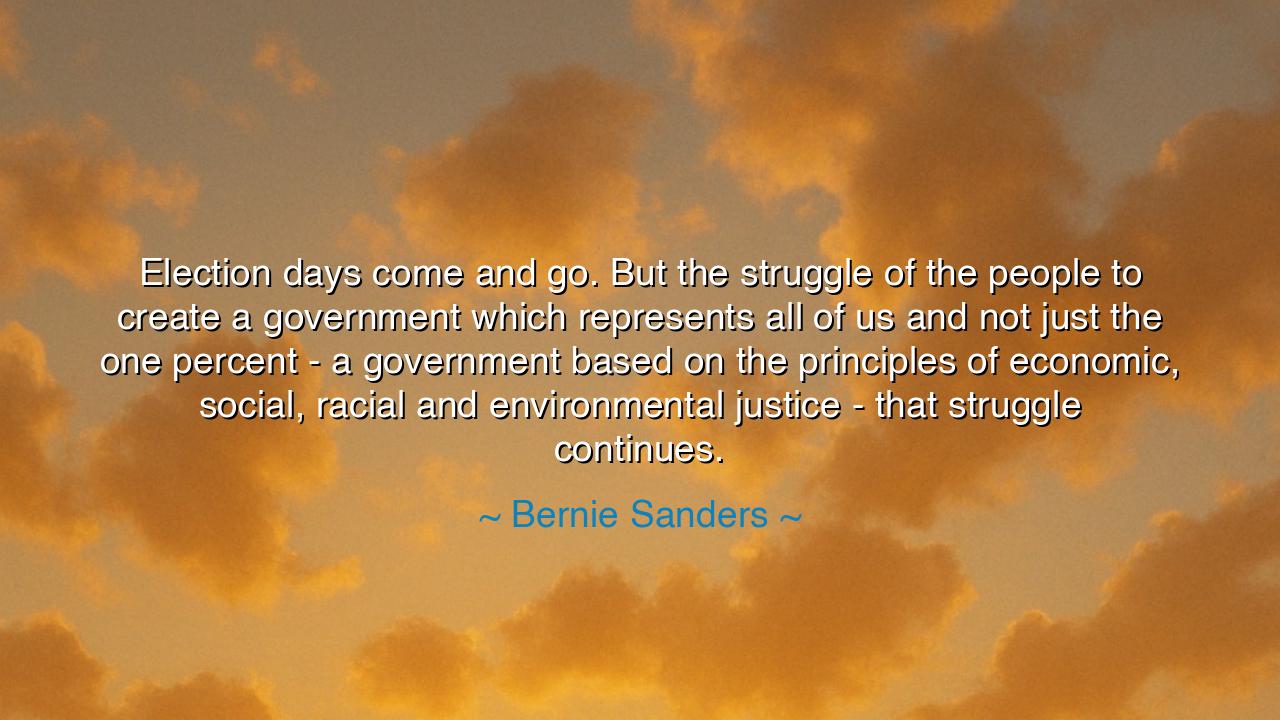
Election days come and go. But the struggle of the people to
Election days come and go. But the struggle of the people to create a government which represents all of us and not just the one percent - a government based on the principles of economic, social, racial and environmental justice - that struggle continues.






The words of Bernie Sanders — “Election days come and go. But the struggle of the people to create a government which represents all of us and not just the one percent — a government based on the principles of economic, social, racial and environmental justice — that struggle continues.” — ring like a trumpet sounding across the hills of democracy. They remind us that the fight for justice does not end when the ballots are counted, nor does the dream of equality sleep between campaigns. In this declaration, Sanders speaks not as a politician but as a prophet of endurance — one who knows that true democracy is not a moment, but a movement, not an event, but a lifelong labor carried by generations who refuse to bow before greed or despair.
The origin of this quote lies in the heart of Sanders’s long career as a reformer and champion of the marginalized. Having risen from humble beginnings in Brooklyn to become one of America’s most recognizable voices for economic and social justice, Sanders witnessed the widening gulf between the powerful and the powerless. His campaigns for the presidency in 2016 and 2020 were not simply bids for office but calls for moral awakening — a demand that the government serve the many, not the few. When he spoke these words, it was in recognition of an ancient truth: that systems of power resist change, and that the duty of the people is not to surrender after defeat, but to persist, to organize, to struggle onward until justice takes root.
This idea — that democracy is a continuous fight — has its echo in every age. In ancient Athens, the cradle of democracy, philosophers like Pericles and Solon taught that the health of the republic depended on constant vigilance. For even then, the wealthy sought to dominate the common man, to bend the laws toward their own gain. The Athenians knew that freedom, once won, must be guarded like a flame against the wind. Likewise, Sanders’s words remind us that every generation must rekindle that flame — for power, left unchecked, will always try to dim it. The struggle continues because human greed and injustice are tireless, and therefore, so must the people be.
History itself testifies to this truth. Consider the long march of the civil rights movement in America. After the Emancipation Proclamation, slavery was abolished — yet oppression merely changed its form. After the Civil Rights Act, segregation fell — yet inequality remained. Even after victories in the courts and the streets, the struggle endured. Dr. Martin Luther King Jr., before his death, turned his fight from racial equality to economic justice, declaring that freedom without fair wages and opportunity was but an illusion. Sanders’s words follow that same spirit — that justice must be holistic, not partial; that a society cannot call itself free while poverty chains millions, while the earth itself groans under exploitation, while the color of one’s skin or the place of one’s birth determines one’s destiny.
The phrase “the one percent”, which Sanders wields like a sword of truth, symbolizes not merely wealth, but imbalance — the ancient disease of civilization where power concentrates in the hands of a few while the many labor in their shadow. Every empire has fallen to this sickness. Rome decayed when its wealth pooled into the villas of the elite and its citizens lost faith in the republic. The French monarchy crumbled when nobles dined in splendor while peasants starved in the streets. And in every instance, it was the people — weary, yet unbroken — who rose to demand that government serve all, not just the privileged. Sanders’s warning is thus timeless: the failure to pursue economic and moral balance is not merely unjust — it is the death of democracy itself.
Yet his tone is not despairing, but hopeful and defiant. When he says “the struggle continues,” he honors the idea that progress is born from persistence. The moral arc of history, as Dr. King said, bends toward justice — but only because brave souls keep bending it. Sanders calls upon us to see beyond elections, to understand that ballots are not the end, but the beginning of responsibility. Real change is built in the quiet work of communities — in organizing, educating, voting, and holding leaders accountable. The true victory is not a single election won, but a world transformed by the steady labor of conscience.
So let this be the lesson carried forward like scripture: justice is not seasonal; it is eternal. When the banners come down and the crowds disperse, the work must go on. The decent man does not rest when his candidate loses, nor does the wise woman grow complacent when her side wins. The struggle for fairness — economic, racial, social, and environmental — belongs to all, always. A society worthy of its name must rise each morning asking how it can serve not only itself, but the generations yet unborn.
And thus, remember the immortal wisdom of Bernie Sanders: elections pass, but justice endures. The true measure of a people is not how they vote once, but how they live daily in pursuit of dignity for all. Let your heart not tire in the face of delay, nor your faith falter when power resists. For as long as inequality exists, the struggle must continue — not out of anger, but out of love for humanity. And love, when armed with perseverance, can move even the mightiest empire toward the light.






AAdministratorAdministrator
Welcome, honored guests. Please leave a comment, we will respond soon